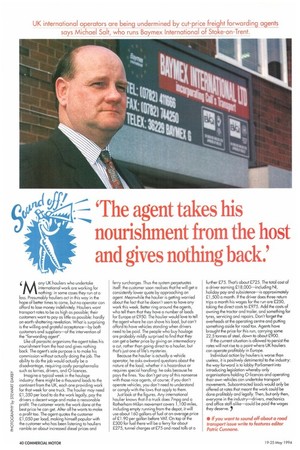'The agent takes his nourishment from the host and gives nothing back.'
Page 42

If you've noticed an error in this article please click here to report it so we can fix it.
‘ any UK hauliers who undertake international work are working For nothing: in some cases they run at a loss. Presumably hauliers act in this way in the hope of better times to come, but no operator can afrd to lose money indefinitely. Hauliers want transport rates to be as high as possible; their customers want to pay as little as possible: hardly an earth-shattering revelation. What is surprising is the willing and grateful acceptance—by both customers and suppliers—of the intervention of the "Forwarding agent'.
Like all parasitic organisms the agent takes his nourishment from the host and gives nothing back. The agent's sole purpose is to make his commission without actually doing the job. The ability to do the job would actually be a disadvantage, requiring costly paraphernalia such as lorries, drivers, and 0-licences.
Imagine a typical week in the haulage industry: there might be a thousand loads to the continent from the UK, each one providing work for that week for one truck. The haulier may need £1,350 per load to do the work legally, pay the drivers a decent wage and make a reasonable profit. The customer wants the work done at the best price he can get. After all he wants to make a profit too. The agent quotes the customer £1,050 per load, making himself popular with the customer who has been listening to hauliers ramble on about increased diesel prices and ferry surcharges. Thus the system perpetuates itself: the customer soon realises that he will get a consistently lower quote by approaching an agent. Meanwhile the haulier is getting worried about the fact that he doesn't seem to have any work this week. Better ring around the agents, who tell them that they have a number of loads for Europe at £950. The haulier would love to tell the agent where he can shove his load, but can't afford to have vehicles standing when drivers need to be paid. The people who buy haulage are probably mildly surprised to find that they can get a better price by giving an intermediary a cut, rather than going direct to a haulier, but that's just one of life's mysteries. Because the haulier is actually a vehicle operator, he asks awkward questions about the nature of the load, whether it is hazardous or requires special handling: he asks because he pays the fines. You don't get any of this nonsense with those nice agents, of course; if you don't operate vehicles, you don't need to understand or comply with the laws that apply to them. Just look at the figures. Any international haulier knows that if a truck does 7mpg and a Rotherham-Milan movement covers 1,100 miles, including empty running from the depot, it will use about 160 gallons of fuel at an average price of £1.90 per gallon before VAT. On top of the £300 for fuel there will be o ferry for about £275, tunnel charges at £75 and road tolls at a further £75. That's about £725. The total cost of a driver earning £18,000—including NI, holiday pay and subsistence—is approximately £1,500 a month. IF the driver does three return trips a month his wages for the run are £250, taking the direct costs to £975. Add the costs of owning the tractor and trailer, and something for lyres, servicing and repairs. Don't forget the overheads at the operating centre and putting something aside for road tax. Agents have brought the price for this run, carrying some 22.5 tonnes of steel, down to about £900.
If the current situation is allowed to persist the rates will not rise to a point where UK hauliers can operate profitably in Europe. Individual action by hauliers is worse than useless, it is positively detrimental to the industry: the way forward is to lobby Parliament into introducing legislation whereby only organisations holding 0-licences and operating their own vehicles can undertake transport movements. Subcontracted loads would only be offered at rates that meant the work could be done profitably and legally. Then, but only then, everyone in the industry—drivers, mechanics and office staff alike—could be paid the wages they deserve.
























































































